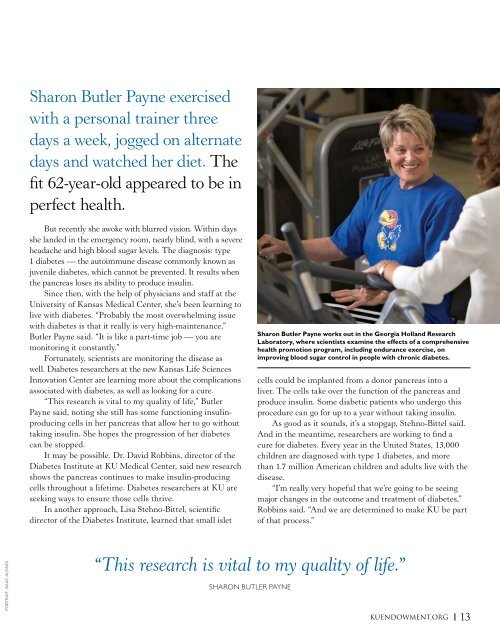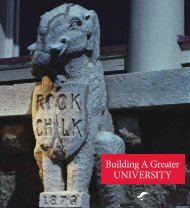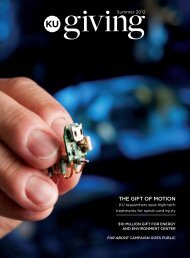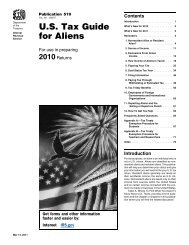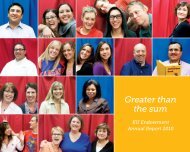Issue #2: Fall 2007 (pdf) - KU Endowment
Issue #2: Fall 2007 (pdf) - KU Endowment
Issue #2: Fall 2007 (pdf) - KU Endowment
You also want an ePaper? Increase the reach of your titles
YUMPU automatically turns print PDFs into web optimized ePapers that Google loves.
“Just running into each other in the hall, you share ideas. You have<br />
a problem, and you get it fixed in the hallway at the water cooler.”<br />
LISA STEHNO-BITTEL on the collaborative working environment at the Kansas Life Sciences Innovation Center<br />
LISA SCHELLER<br />
The Kansas Life Sciences Innovation Center, which opened<br />
in January, houses more than 300 researchers and staff. They<br />
collaborate in their research as they seek ways to prevent,<br />
treat and cure many serious diseases and medical conditions.<br />
Synergy at work<br />
To understand how diseases and the environment affect<br />
reproductive success, Michael Wolfe studies functions at the<br />
cellular and molecular levels. His laboratory is designed for<br />
many types of research — so scientists with related goals can<br />
work together easily.<br />
Broad view<br />
Diabetes is just one area of research at the life sciences<br />
innovation center, which opened in January in Kansas City,<br />
Kan. Every day, more than 300 researchers and staff are<br />
looking for ways to treat, cure or prevent serious diseases<br />
and medical conditions.<br />
At the corner of 39th Street and Rainbow Boulevard,<br />
the center stands tall and filled with light. It’s the newest<br />
addition to the <strong>KU</strong> Medical Center complex, symbolizing<br />
the Medical Center’s commitment to establishing itself as a<br />
world-class research center.<br />
The new building also symbolizes a partnership<br />
among the state of Kansas, the Medical Center and private<br />
philanthropy. Funding of the $57-million, 205,000-squarefoot<br />
facility resulted from an agreement between the state<br />
and the Medical Center. In addition, the Hall Family<br />
Foundation of Kansas City, Mo., donated $27 million for<br />
state-of-the-art laboratory equipment.<br />
Paul Terranova, the Medical Center’s vice chancellor<br />
for research, said the life sciences innovation center<br />
Joyce Slusser directs the Flow Cytometry Laboratory, one of the<br />
center’s research cores. Above, she uses laser light to analyze<br />
and detect differences between cells. The technology has many<br />
applications, including detection of cancer. A gift from the Hall<br />
Family Foundation provided the lab’s high-tech equipment.<br />
includes established programs, such as those in liver<br />
research, reproductive sciences and neuroscience, that<br />
draw significant grant funding. The building also houses<br />
emerging programs in diabetes management and in<br />
proteomics, the study of proteins and their functions.<br />
The center’s exceptional laboratory spaces and<br />
technology have enhanced recruitment efforts. Terranova<br />
estimated more than a third of the researchers are<br />
new. Moreover, the center was designed to increase<br />
communication among researchers by designating a<br />
separate research focus for each floor.<br />
“We thought if we had people together who could talk<br />
to each other, share research, share ideas, we could develop<br />
a certain degree of synergy so that the whole would be<br />
greater than the sum of its parts,” Terranova said.<br />
Though research is ongoing, it’s difficult to predict<br />
when the results of the findings will make it into<br />
mainstream medicine.<br />
“You never know,” Terranova said. “You could make a<br />
major discovery tomorrow, and it could have a major impact.”<br />
Designed to foster interaction, the center’s interior architecture<br />
includes conference rooms and informal seating areas as well as space<br />
for impromptu meetings. Here, Paul Terranova, <strong>KU</strong> Medical Center<br />
vice chancellor for research, confers with Yvonne Wan, one of the<br />
Medical Center’s leading liver researchers.<br />
Better lives<br />
This research eventually will make a difference in the lives<br />
of those diagnosed with many diseases, including diabetes.<br />
“Research today has already led me to a new drug that<br />
allows me to be free from insulin completely,” Butler Payne<br />
said. “I feel great and, with exercise, can manage my diabetes<br />
easily; think how far research can lead us in the future.”<br />
Stehno-Bittel appreciates how the life sciences center’s<br />
design helps researchers work together. “There is so much<br />
more collaboration among the groups here,” she said. “Just<br />
running into each other in the hall, you share ideas. You<br />
have a problem, and you get it fixed in the hallway at the<br />
water cooler.”<br />
HELP FIND A CURE<br />
To support any area of research at the Kansas Life Sciences<br />
Innovation Center, give online at kuendowment.org/medcenter<br />
or contact Stephanie Grinage at <strong>KU</strong> <strong>Endowment</strong>’s office at<br />
<strong>KU</strong> Medical Center, 1-888-588-5249.<br />
Fourth floor: Yvonne Wan leads researchers who study<br />
factors that control liver functions. Their work will lead<br />
to treatment and prevention of diseases such as alcoholic<br />
hepatitis, gallstones, liver cancer and diabetes.<br />
Third floor: Investigators led by Paul Terranova<br />
study male and female reproductive function as well as<br />
pregnancy. They also search for causes and treatments for<br />
diseases that cause infertility and ovarian cancer.<br />
Second floor: In the neuroscience center, directed<br />
by Peter Smith, researchers study the nervous system.<br />
Research is aimed at areas such as diabetes, disorders<br />
affecting hearing and balance, and female pain syndromes<br />
associated with estrogen (including migraine and<br />
fibromyalgia).<br />
First floor: Investigators in the proteomics program, led<br />
by Gerald Carlson, study proteins that make up the body<br />
and regulate cell function. Their work relates to various<br />
diseases, including cancer and Alzheimer’s.<br />
Ground floor: Dr. David Robbins directs the Diabetes<br />
Institute, where outpatients learn about nutrition and<br />
exercise in preventing and managing diabetes.<br />
Research cores: Twelve specialized laboratories provide<br />
the latest technology to all Medical Center researchers<br />
and other area research institutions.<br />
14 <strong>KU</strong> GIVING FALL <strong>2007</strong> kuendowment.org 15


